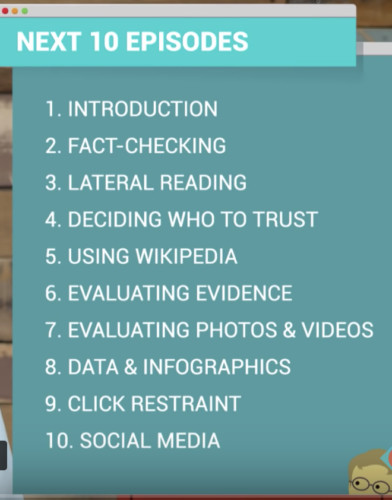John Green, the beloved author and educational content creator, has launched a vital series in his popular Crash Course educational video series: Navigating Digital Information. This series is a crucial tool for anyone looking to improve their media literacy and critical thinking skills in today’s increasingly complex digital world.
In partnership with MediaWise, a project from the renowned Poynter Institute and funded by Google, and with curriculum developed by the Stanford History Education Group (SHEG), this Crash Course series tackles the urgent need for digital literacy education. SHEG, known for its impactful research, including the revealing study “Evaluating Information: The Cornerstone of Civic Online Reasoning,” brings its expertise to this essential project.
Why is this series so important? As John Green explains in the introduction to the series, the information we consume online profoundly shapes our understanding of the world and ourselves. In an age of endless scrolling, the quality of information we encounter, and the algorithms that curate it, significantly influence our thoughts, values, trust, and actions. Misinformation and disinformation are not just shaping political and social discussions; they are shaping us as individuals and communities. Developing strong information evaluation skills is essential for becoming informed citizens and engaged individuals.
The second episode, “The Facts about Fact Checking: Crash Course Navigating Digital Information,” dives directly into the core of media literacy: fact-checking. John Green emphasizes the importance of actively questioning the information we find online, encouraging viewers to strengthen their “information analyzing muscles.” He succinctly states, “better information leads to better decision-making, which leads to a better world.”
To aid in this process, John Green proposes three key questions to consider when encountering information online:
- Who is behind the information? Understanding the source is the first step in evaluating credibility.
- Why are they sharing the information? Identifying the motivation behind the information helps to uncover potential biases.
- What types of claims are being made? Examining the claims and the evidence supporting them is crucial for discerning accuracy. Are claims backed by reliable evidence, and what do other credible sources say?
Using a relatable example involving a tweet about steel straws, John Green illustrates the necessity of data-driven discussions and cost-benefit analysis. He expertly navigates the subtle distinction between healthy skepticism and unproductive cynicism. The series also delves into the concepts of echo chambers and filter bubbles, using a personal, hypothetical sports example to demonstrate how pre-existing beliefs can influence our skepticism towards new information.
The comprehensive 10-episode series promises to cover a wide range of topics critical to navigating the digital landscape.
For educators and individuals alike, John Green’s Crash Course: Navigating Digital Information is an invaluable resource. Complementing the video series, SHEG provides excellent curricular resources to further enhance learning and application of these vital digital literacy skills. This Crash Course series is not just informative; it’s an engaging and essential guide to becoming a more discerning and informed digital citizen.

